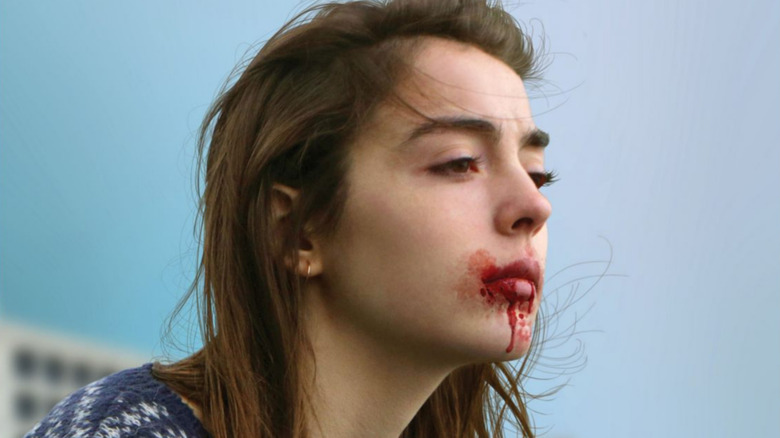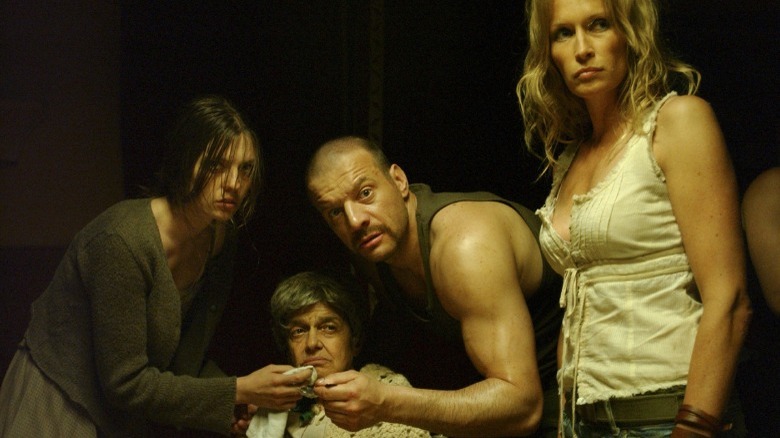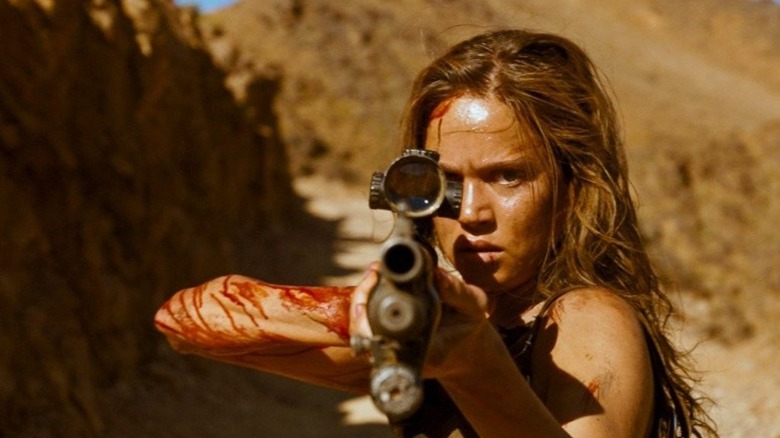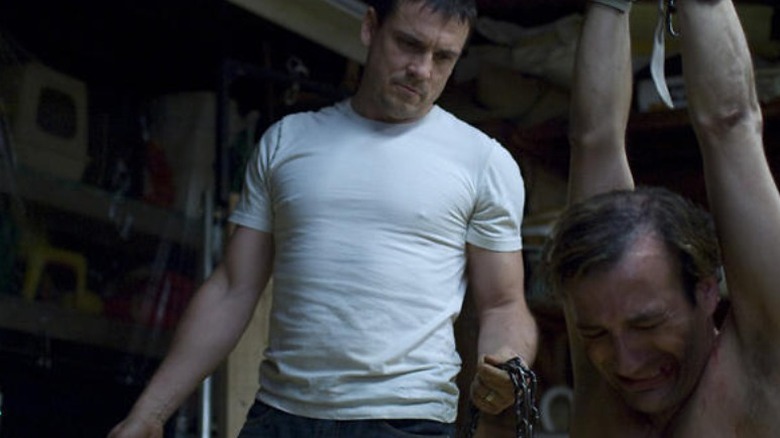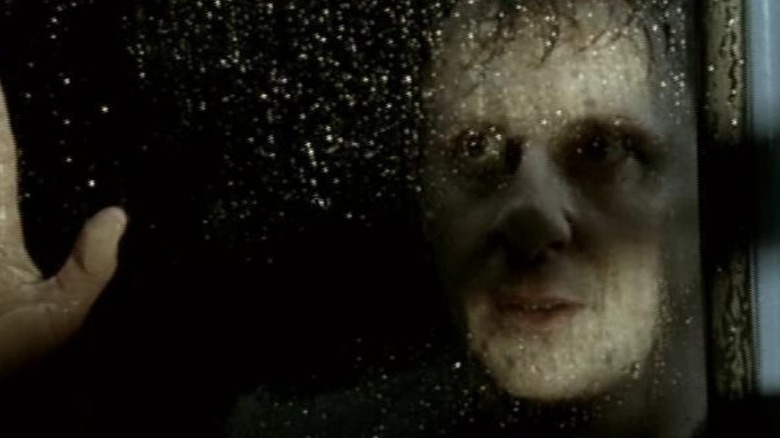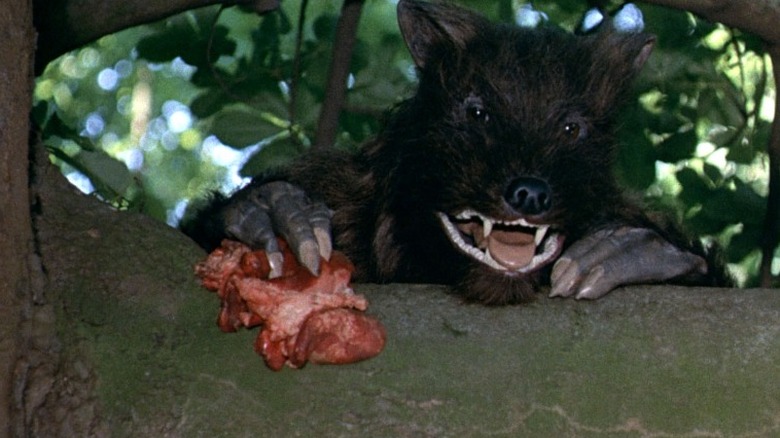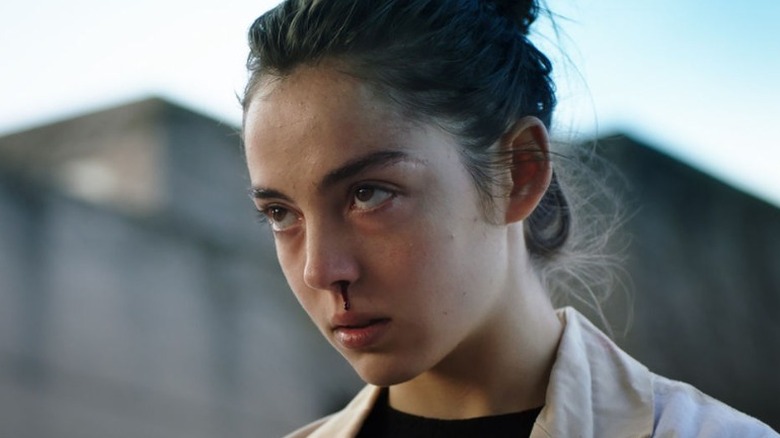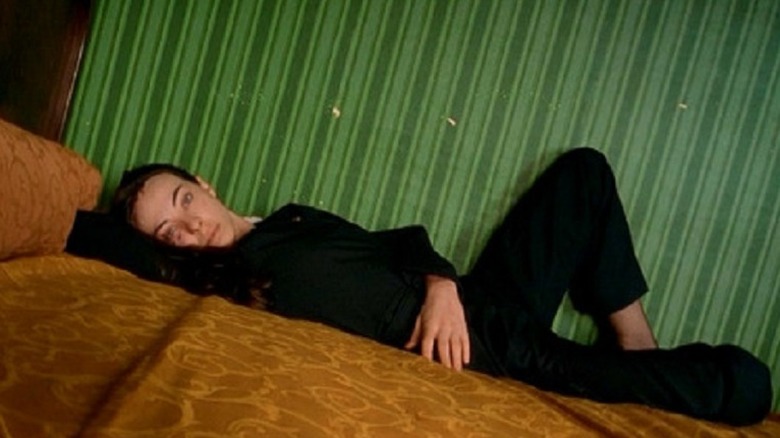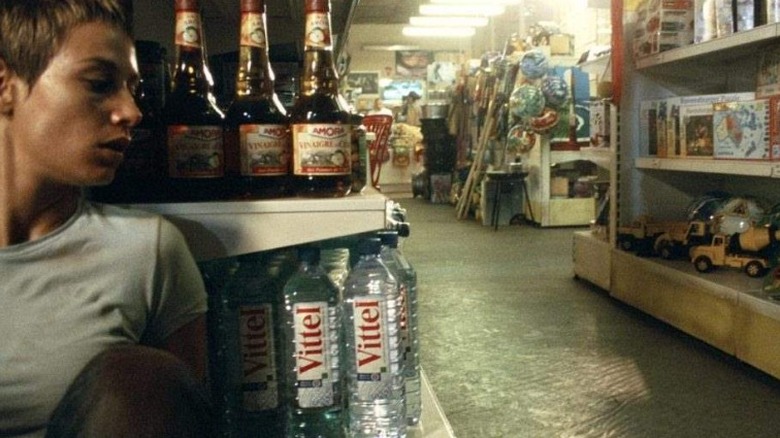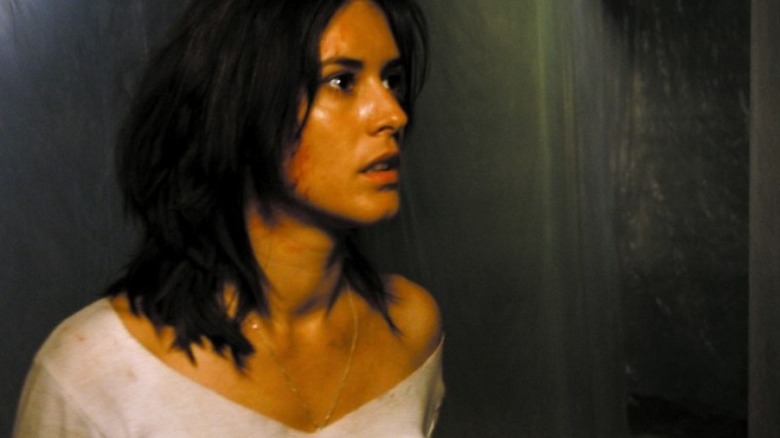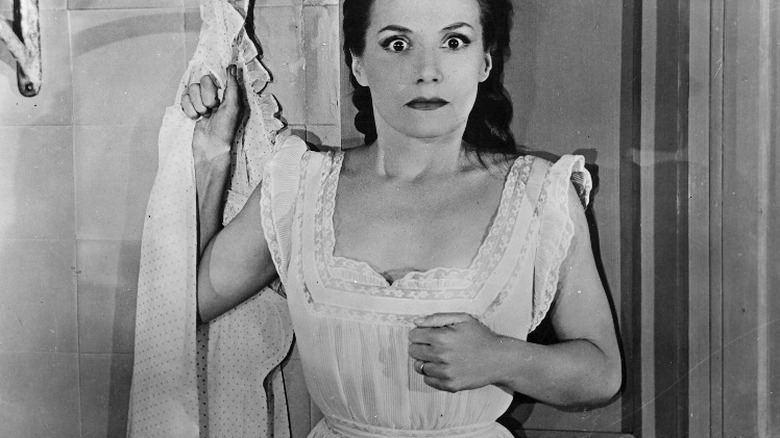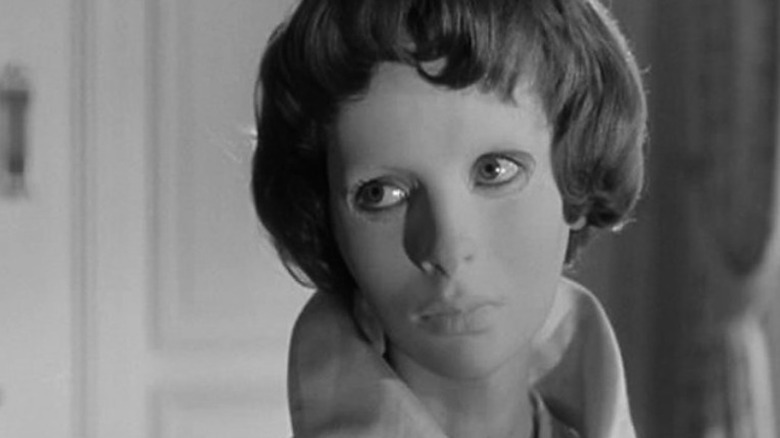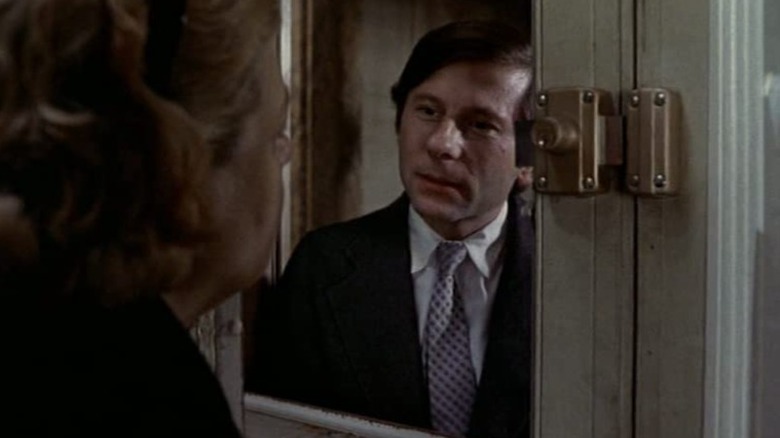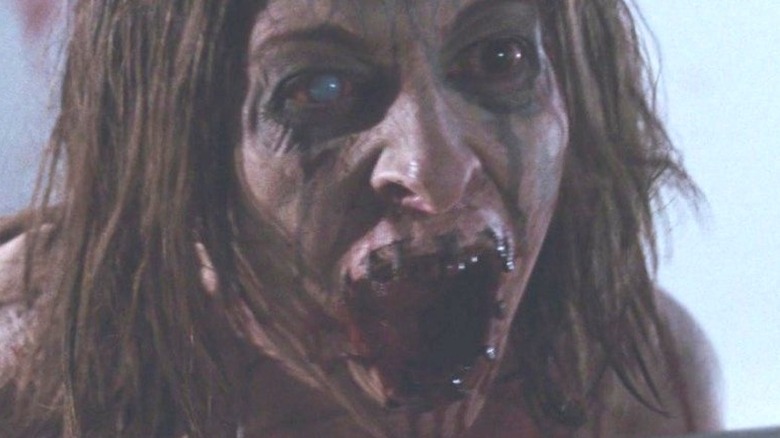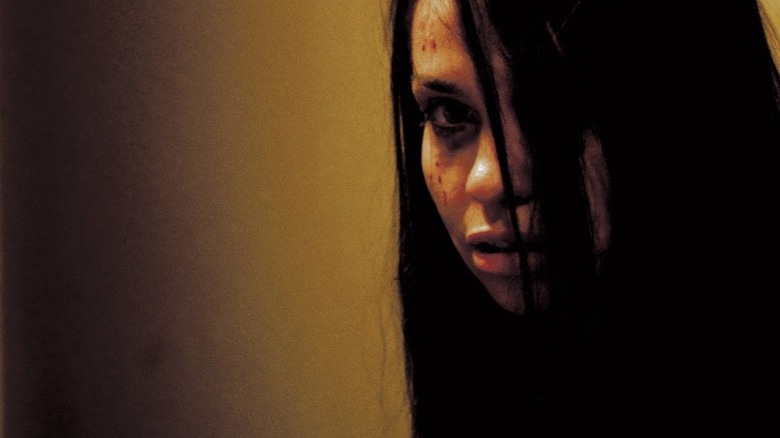The 14 Best French Horror Movies Ranked
French horror cinema, much like horror cinema in the west, has enjoyed a long and storied history. Perennially a reflection of its time and the common fears and ailments therein, the genre has undergone several distinct shifts. Early noir with perverse psychological underpinnings gave way to the French New Wave, otherwise known as La Nouvelle Vague. The movement emerged in the late '50s, a stylistic and narrative approach that subverted conventional filmmaking techniques for iconoclasm, experimental editing, and visual styles.
As the decades trundled on, French horror cinema rejected Western constraint, discarding the underpinnings of most horror fare for considerably more extreme, sadistic, and almost insurgent outputs. "Inside" and "Martyrs," for instance, remain some of the most violent movies ever made. Here, we'll be counting down the top French horror movies ever made. These run the gamut from wickedly suspenseful to outright exploitation. In other words, prepare to be scared.
14. Frontier(s)
Xavier Gens' "Frontier(s)" is not for the faint of heart. Released in the United States with an NC-17 rating, a rarity for even the horror genre, Gens' film probes the darkest recesses of humanity via two full hours of some of the bleakest genre cinema France has ever produced. Riots in Paris are spurred by the success of a far-right candidate, and caught in the middle are Yasmine (Karina Testa) and Sami (Adel Bencherif), two of several young Muslim youths hoping to steal some money and flee from the chaos. After Sami is shot, the group splits up, and soon enough find themselves at an inn near the French border run by innkeepers Gilberte (Estelle Lefébure) and Klaudia (Amélie Daure).
The savagery that follows is almost unprecedented. With narrative shades of "The Texas Chain Saw Massacre" coupled with the iconography of the French Extremity Moment, "Frontier(s)" never holds back. The violence drips in every frame, and even ravenous gorehounds will find their limits tested. An interrogation of neo-fascism and the ostensibly pastoral ideas of old, "Frontier(s)" crucifies the sins of the past by launching an all-out assault on the present. It's lean, mean, and borderline sadistic. It's also, for those who can stomach it, scary as hell.
13. Revenge
"Revenge" is a pastel, candy-colored romp that stretches credulity to make a terrifying point –- men don't care about the violence they promulgate. Matilda Lutz is sensational as Jen, an American socialite having an illicit affair with a married neighbor, Richard (Kevin Janssens, bearing an uncanny resemblance to Nikolaj Coster-Waldau for most of the runtime). They abscond to Richard's desert property for a weekend away, but things go awry when Richard's hunting buddies show up. Though merry at first, one assaults Jen while Richard is away, and rather than sympathizing, the men opt instead to silence her.
Coralie Fargeat's "Revenge" is a propulsive reinterpretation of horror convention. Left for dead after being impaled on a tree, Jen rises as something of an avenging angel — signified as much when she brands herself with a beer can to cauterize her wound. Little of it is grounded in reality, and the deaths are almost comically violent, though the point remains. A microcosm of our current culture, what's dismissed as bubblegum horror fantasy here remains all too real for some members of the audience. That's true terror.
12. 7 Days
"7 Days," titled "Les 7 jours du talion" in French (which roughly translates to "The 7 Days of Retaliation"), is so thoroughly terrifying and assaultive in its content, it's unlikely audiences will be able to see it more than once. Similar to Belgium's "The Treatment," another horrifically dark and dour genre exercise, "7 Days" is an endurance test.
Bruno Hamel's (Claude Legault) daughter is raped and murdered in a park, and when the police arrest a suspect, Lemaire (Martin Dubreuil), Bruno kidnaps him, planning to take revenge. He phones the police and tells them that in seven days, on his daughter's birthday, he will murder Lemaire, at which point he intends to give himself up to the police. In the week that follows, Bruno brutally tortures Lemaire. Kneecaps are smashed, animals are gutted, and Lemaire is made to confront the savagery of his crimes in increasingly gruesome ways. Ripe for debate, "7 Days" is firm in its conviction — revenge is wrong — though there is enough nuance and violent verisimilitude to leave even the most passive viewers wondering whether they might do the same.
11. Calvaire
Our own Matt Donato ranked "Calvaire" 28 out of 82 on his list of the best Christmas horror movies ever made, and he did so with good reason. "Calvaire" is a seriously disturbing slice of backwoods horror juxtaposed with Christmas cheer. Director Fabrice Du Weiz, in his feature debut, probes the darkest recesses of the human mind in a way the horror genre is distinctly capable of doing.
Laurent Lucas stars as Marc Stevens, a young musician traveling in the country. After performing at a nursing home on Christmas eve, he finds himself on the road, though shortly after, his van breaks down in a deserted region. Mr. Bartel (Jackie Berroyer), an innkeeper, takes him in, but Mr. Bartel is psychologically unwell, and soon, Marc's night becomes more horrific than he ever imagined. Certainly not for the faint of heart –- "Calvaire" features several scenes of sexual violence and abhorrent animal cruelty -– it's still one of the scariest French genre imports ever. Unhinged, deeply chilling, yet gorgeously composed, "Calvaire" is poised to haunt dreams long after it's over.
10. The Beast
"The Beast," otherwise known as "La Bête," is a classic, though it's certainly not for everyone. A deeply erotic horror-fantasy hybrid, director Walerian Borowczyk's "The Beast" is a loose retelling of "Beauty and the Beast," though it's more allusion than outright adaptation, borrowing the woman-beast relationship and little else. Though highly charged in its sexuality, Borowczyk is still mindful enough to incorporate considerable horror elements, and as such, "The Beast" is fondly remembered as a cult classic.
Lisbeth Hummel stars as Lucy Broadhurst, a young woman bequeathed her father's estate after his death on the condition that, within six months of his passing, she marry Mathurin de l'Esperance (Pierre Benedetti). "The Beast" is hazy and committed to its dreamlike aura, so much so that the plot itself is almost incidental to the imagery. There are graphic allusions to bestiality, and though violence is sparse, it's still unsettling when it does appear. If nothing else, "The Beast" is a cinephile's dream, a movie unmatched in its sheer brazenness and erotic subversion of conventional fairy tale mythos.
9. Raw
Director Julia Ducournau's "Raw" took the world by storm when it premiered at the 2016 Cannes Film Festival, the same festival where Ducournau's next feature, "Titane," was recently awarded the Palme d'Or. Ducournau is a filmmaker with a singular vision, and while "Titane" is clearly poised to cement her legacy, it's worth remembering the debut feature film that started it all.
Combining coming-of-age sensibilities with, yes, cannibalism, "Raw" is simultaneously tender and aberrant, a movie that commands attention like a hand around the throat and refuses to ever let go. Justine (Garance Marillier) has just begun her first semester at veterinary school. After a hazing ritual that involves eating raw rabbit kidneys, Justine develops a strange rash and soon -– despite being a vegetarian -– feels an overwhelming desire to eat more meat. I won't spoil what follows, but it is as graphic as it is profound. For fans of wickedly cruel horror cinema, "Raw" packs a real bite.
8. In My Skin
The French love body horror. While David Cronenberg is the king of that subgenre here in North America, the French have had several hits of their own, and "In My Skin" is one of the templates that started it all. Thoroughly upsetting and psychologically chilling, "In My Skin" is all but guaranteed to get under yours.
Esther (Marina de Van) injures her leg at a party after stumbling over some industrial supplies. Though she initially brushes it off, she grows both increasingly fascinated with her inability to feel pain there and, more broadly, the nature of her body in general. Esther spirals and engages in increasingly gruesome acts of self-mutilation. She slices at her skin and cuts the folds of her legs and even goes so far as to chew at it while alone in a motel. It's not for the squeamish or faint of heart, to be sure, yet it remains one of the most propulsive works interrogating our relationships with our bodies and our penchant for consciously destroying something so delicate.
7. High Tension
"High Tension" is likely one of the better-known French horror films in the United States, on account of it receiving a wide release stateside and director Alexandre Aja's English-language horror output (see: "The Hills Have Eyes" and "Crawl"). Ludicrous ending aside -– seriously, it's almost but not quite enough to ruin the move in its entirety -– "High Tension" is a breakneck home invasion slasher that, even almost 20 years later, remains unmatched in its high octane scares.
Cécile de France stars as Marie, a young woman traveling with her friend, Alex (Maïwenn), to spend the weekend at the latter's country home. The hope is to study, though Marie, harboring a secret attraction toward Alex, is hoping it might lead to something more. Their first night there, a serial killer in a trucker's uniform breaks in and graphically murders Alex's entire family, including her adolescent brother. Alex is kidnapped, and Marie -– by virtue of being a guest -– remains undetected. Marie manages to stow away in the killer's truck, and so begins a night spent playing a vicious game of cat-and-mouse as Marie eludes the killer and endeavors to free her friend. Originally rated NC-17, "High Tension" was trimmed and dubbed for its U.S. release, though it remains no less violent and terrifying for it. "High Tension" is an understatement.
6. Them
Before "The Strangers," there was "Them." No, not the movie about giant atomic ants. This "Them" is an austere and slim French home invasion thriller. Clocking in at just 74 minutes, the film wastes no time getting to the unbridled terror of unknown faces intruding upon one's domicile.
After an opening scene that lays the foundation for what's to come, "Them" shifts focus to Clémentine (Olivia Bonamy), a school teacher, and her boyfriend, Lucas (Michaël Cohen). While staying the night at Lucas', Clémentine is woken by the sound of music outside, and when they go to investigate, they realize a group of intruders have broken in. Following the same format "The Strangers" would apply just a few years later, "Them" is less concerned with narrative depth and character development than it is the verisimilitude of home invasion. Short, terrifying, and chillingly random, "Them" is one of the scariest home invasion movies ever made because it feels so real. Additionally, though no reports have surfaced to support the veracity of the claim, "Them" is ostensibly based on a true story.
5. Diabolique
"Diabolique," titled "Les Diaboliques" in French (which loosely translates to "The Devils") was remade in 1996 with Sharon Stone and Isabelle Adjani. Skip that one, for as pulpy and sultry as it might be, it's no match for the sheer power of the original. A noir thriller with horror undertones, "Diabolique" follows a wife, Christina (Véra Clouzot), who alongside her husband's mistress, Nicole (Simone Signoret), plan to murder their husband and lover respectively. A cruel headmaster, he is abusive to Christina, Nicole, and the children, and both concede the world would be better off without him.
Right away, "Diabolique" eschews antagonism to have these women team up to kill the cruel man in their lives, though "Diabolique" really gets going when the husband, Michel's (Paul Meurisse) body disappears, and Christina especially begins to believe he is still alive or something much worse. Frequently bone-chilling, it's one of the best psychological thrillers ever made. An early blueprint for works ranging from "Psycho" to "Gone Girl," "Diabolique" cannot be missed.
4. Eyes Without a Face
"Eyes Without a Face" is the oldest entry on this list, though it is also one of the best. Immediately recognizable even among non-genre initiates, Georges Franju's classic has remained wildly influential in the 60 years since its release. Pierre Brasseur stars as Doctor Génessier, a plastic surgeon determined to perform a face transplant on his daughter, Christiane (Édith Scob), after she is disfigured in a horrific car accident.
Christine wears a mask for most of the film, lending "Eyes Without a Face" its most iconic bit of imagery. Modeled after her face, it's both alluring and uncanny, adding a veneer of unease to every scene. To graft a face, though, Doctor Génessier needs a face, and, well, he's going to get one. By dint of its year of release, "Eyes Without a Face" is noticeably less graphic than other entries here, but it is no less terrifying. Sometimes, mere suggestion is scarier than what can be seen, and Georges Franju has conceived a classic that's not simply one of the scariest French movies ever made, but one of the scariest movies of all time.
3. The Tenant
It must be mentioned here that Roman Polanski is a criminal. A coward who has largely avoided his own reckoning on account of extradition laws and a fervent cinema-going public, the director's crimes remain, no matter how profound his body of work is. It's difficult, then, to reconcile the creator and the art. Polanski's work continues to exist despite his crimes, and as such, so too does the legacy and perennial influence of even his earliest works. "The Tenant" is no exception. Polanski is both behind and in front of the camera here, and for as abhorrent a man as he is, "The Tenant" was groundbreaking in its psychological subtext and remains a seminal horror work today.
An uncredited Polanski stars as Trelkovsky, a young man who rents an apartment in Paris and soon thereafter finds his mental state unraveling. He has visions, hears strange wails, and even imagines (or not) his neighbors accosting and assaulting him. The imagery is deeply disturbing and unreliable, and the entirety of the psychological thriller subgenre would not be what it is without "The Tenant." It's a hard movie to recommend on account of the man who made it, but "The Tenant" laid the groundwork for almost 50 years of thrillers. Do with that what you will.
2. Martyrs
These final two entries, alongside "High Tension," are likely the best known French horror movies in the United States. Though often reduced to exhibitions of savagery -– and both "Martyrs" and the forthcoming "Inside" are exceptionally gruesome, make no mistake -– both have considerably more going on behind the spraying blood and flayed skin.
"Martyrs," directed by Pascal Laugier, is ostensibly the story of a young woman (Mylène Jampanoï) tracking down the family who kidnapped and abused her years prior. At first, it appears to be her story, though it soon shifts attention to Anna (Morjana Alaoui), Lucie's best friend, and the savagery she endures while helping Lucie overcome her trauma. Torture, martyrdom, and existential questions of life and death abound, and while "Martyrs" is by no means an easy watch, it is nonetheless a profound meditation on trauma and abuse and the scars, even decades later, both can leave behind. Nothing has matched its potency since release, and there's a strong chance nothing ever will.
1. Inside
"Inside" is a masterpiece and is poised, if it hasn't already, to enter the pantheon of classic slasher films. Alongside "Psycho," "Black Christmas," Halloween," and "Scream," among others, "Inside" is an enduring and terrifying home invasion slasher with way more on its mind than carnage (though rest assured, there is plenty of that). The feature debut from French directing duo Julien Maury and Alexandre Bustillo, the film stars Alysson Paradis as Sarah, a pregnant woman spending Christmas alone following an auto accident that killed her husband.
When she turns in for the night, a woman -– credited simply as "La Femme" (frequent collaborator Béatrice Dalle) -– breaks in, intending to literally cut Sarah's baby out of her body and take it as her own. As expected, the violence is almost cruel, and there's more blood here in one scene than most movies cram into entire franchises. It's painful, deeply uncomfortable, yet never anything but totally rapturous. Conceptually, "Inside" is unlike anything else. It's terrifying, visceral, and leaves a lasting impact.
